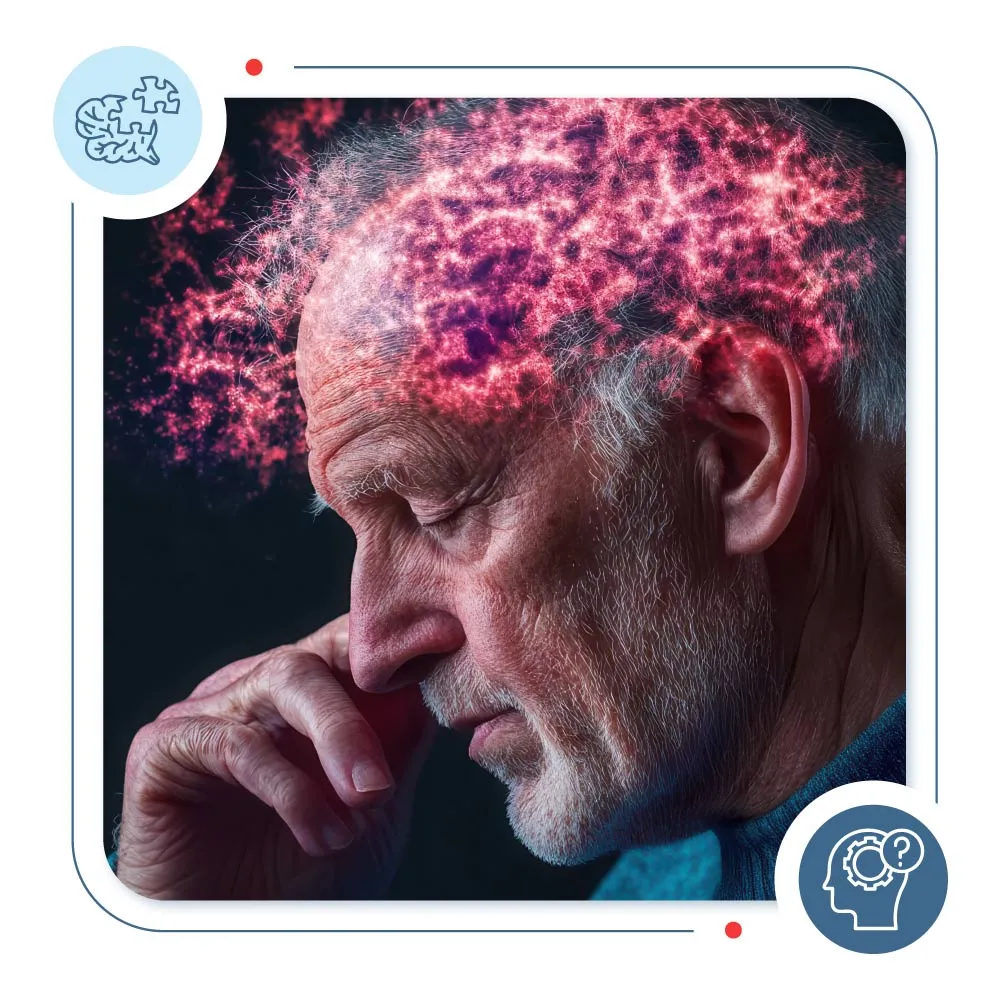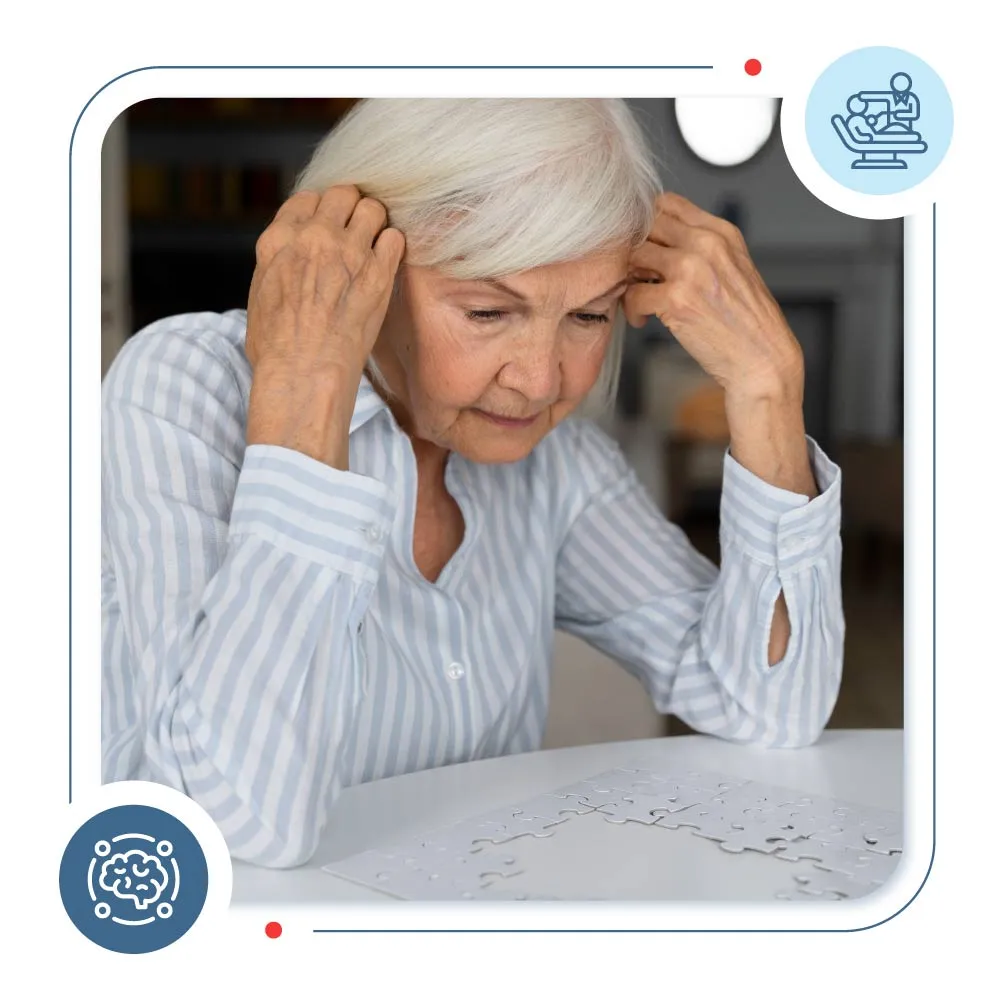dementia

What is Dementia?
Dementia is an umbrella term that encompasses many disorders. It is not one single disease but rather a group of symptoms presenting as a decline in cognitive abilities to the point that it interferes with your daily routine. Dementia typically presents with the loss of memory and is often the earliest indicator of many underlying disorders. But not all cases of memory loss are rooted in dementia.
Dementia prevalence is not the same across the globe and varies greatly according to region, race, gender, or age. Dementia was noted to affect 8.2% of people older than 72 in the US in a 2021 survey. Dementia is more likely to affect older people, with a slight gender predominance of females being affected more than males.
Mid Cities Psychiatry offers you the most reliable diagnostic approaches and dementia treatment near Euless, TX. Connect with our team and schedule your consultation to reshape your future.

Dementia symptoms
Not everyone experiences the same dementia symptoms, as the term dementia covers a variety of disorders affecting cognition. Nevertheless, the common symptoms you’re likely to have are:
- Facing difficulty focusing on simple tasks, the way you used to focus before
- Recurring memory gaps
- Trouble following the conversation
- Unable to find the right words while talking
- Keep forgetting important appointments or events
- Confused about time or place
- Unstable, wobbly gait
- Numbness or tingling sensations
- Tremors in hands or feet
- Inability to fall asleep or stay asleep
- Getting short-tempered or having sudden mood swings



Dementia Causes
- Cardiovascular diseases like high blood pressure, high cholesterol levels, or diabetes contribute to brain damage
- Down Syndrome
- Medical conditions such as infections, autoimmune disorders, brain tumors, vitamin deficiencies, or thyroid problems can also cause brain damage, which can be reversed by treating the underlying cause
Other risk factors include:
- Head trauma
- Certain medications or alcohol
- Aging, which eventually leads to brain cell wear and tear

Dementia Types
Dementia, being an umbrella term, encompasses many disorders affecting cognition. Various types of dementia include the following:
Alzheimer’s disease
Alzheimer’s disease is among the most common dementia causes. Like our other body cells, brain cells also make proteins. Alzheimer’s disease is characterized by the accumulation of abnormal proteins in the brain that disrupt normal brain function. Common associated risk factors are the inheritance of certain mutated genes, aging, or even environmental pollutants.
Vascular dementia
Just as the name suggests, vascular dementia involves abnormal blood flow to the brain. There can be blood clots or brain hemorrhages that cut off the normal nutrient supply to the brain. Vascular dementia can stem from cardiovascular diseases, strokes, smoking, or obesity.
Lewy body dementia
Lewy bodies are abnormal protein clumps that get deposited in the brain, obliterating the normal brain structure. It is most likely to be associated with gene mutations.
Frontotemporal dementia
The frontal part of the brain controls thinking, emotions, and personality, while the temporal part is involved in interpreting sensory signals of smell, taste, and sound, along with memory storage. Abnormal protein buildup in the frontotemporal brain disrupts emotional and behavioral regulation, with memory disturbances.
Mixed dementia
Many people suffer from a combination of dementia types, which are categorized under mixed-type dementia.
Dementia treatment
Dementia has no cure to date, but regular treatment manages your symptoms and improves the quality of life. Mid Cities Psychiatry provides the best dementia treatment in Euless. Reach out to us and take the first step towards a better tomorrow.
- Dementia medications
Cholinesterase inhibitors
NMDA receptor antagonists
Selective serotonin reuptake inhibitors (SSRIs)
- Dementia Therapies
Talk therapy
Cognitive stimulation
Occupational therapy


FAQs
01
What is the most common type of dementia?
Alzheimer’s disease is the most common type, accounting for 60-70% of cases of dementia.
02
Can I avoid dementia?
While you may not be able to prevent some of the inevitable causes such as mutated genes, you can definitely reduce preventable risk factors that cause dementia. Opt for a healthy lifestyle with a balanced diet and regular exercise to avoid cardiovascular disorders.
03
At what age can dementia start?
You may develop dementia as early as your 30s, but the average age of dementia onset is mid-60s, with increasing rates afterwards.
04
Does dementia affect life expectancy?
Yes. While it may not be the direct cause of death, changes in brain dementia predispose a person to other health problems like falls, infection, low self-care, etc.
05
What is a latest treatment for dementia patients?
Scientists have developed a most promising latest treatment for dementia; a class of medications called ‘monoclonal antibodies’. Donanemab, like lecanemab, is an example. However, these medications are not the cure; they help slow disease progression. Also, not everyone is suitable for this treatment due to their side effect profile.
Real Stories, Real Recovery





We provide a comprehensive care provision for the most common mental issues people struggle with, such as PTSD, ADHD, OCD, anxiety, depression, sleep disorder, schizophrenia, and numerous other mental health conditions.





